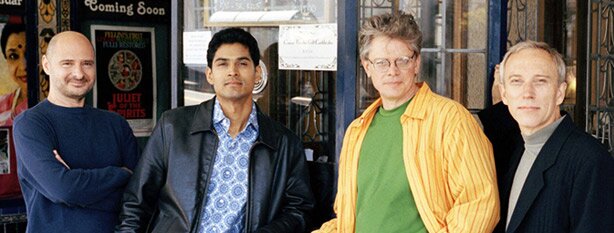
Back in 1973 when the quartet was formed, violinist David Harrington explained to the audience at the Neptune last Friday night, he and his wife lived at La Paz Apartments in the University District, and so this neck of the woods was very familiar–he’d gone for a walk around the old neighborhood before Kronos Quartet took the stage that evening. There were a few empty seats at the back of the balcony, but otherwise the Neptune was full of fans who applauded even more upon learning that the show was being recorded for a “Live from the Neptune!” release, as Harrington joked.
“[I]t’s never clear if you’re listening to a byte or a human,” wrote Andrew Matson in the Seattle Times recently, about THEESatisfaction’s sound, but it’s also true of Kronos Quartet. The official close of the concert, Steve Reich’s WTC 9/11, called for a “total of three string quartets, one live and two pre-recorded.” (A lengthy encore included an arrangement of Bob Dylan’s “Don’t Think Twice, It’s Alright,” Jimi Hendrix’s “Purple Haze,” and “Sim Shalom,” based on a recording by the Jewish cantor Yechiel Karniol, to name a few.)
For many, the chance to hear Reich’s new work was probably enough, despite the $55 ticket price. It’s a harrowing piece, uniting the terror and humanity of 9/11, opening with the violin mimicking an open phone line, and with the anxious voices of air traffic controllers laid, via a “stop-motion sound” technique over the instruments, so that they, too, are instruments. Later come the voices of women who kept vigil over the dead, with the musicians under a red light in front of a red velvet curtain, which shadowed into black at the bottom.
Reich’s piece was preceded by Missy Mazzoli‘s Harp and Altar, a “love song to the Brooklyn Bridge” that draws upon Hart Crane’s famous poem. Fragments of “The Bridge” (pre-recorded and electronically distressed) sung by Gabriel Kahane have a ghostly quality, while the violins trade lyrical shimmer for dense jitters. It’s not a long piece, but it’s transporting, which also happens to be true of Laurie Anderson’s Flow.
We also heard Clint Mansell’s Requiem for a Dream Suite, arranged by David Lang, familiar to both fans of Aronofsky and people who watch movie trailers in general, as the sawing zig-zag on violin captures something both portentous and exhilarating that seems to work for exploding cars as well as tense personal dramas, and never get earwormily old. (Beethoven’s Ode to Joy used to be a similar bait-and-switch go-to, thundering in the trailer but not appearing in the movie itself.) Clint Mansell, I was reminded by the program notes, is a founding member of Pop Will Eat Itself.
It’s a commonplace that a Kronos Quartet program is eclectic–this one included Bryce Dessner’s Aheym (“homeward” in Yiddish), Ramallah Underground’s Tashweesh, Midhat Assem’s Ya Habibi Ta’ala (arranged by Golijov), Omar Souleyman’s La Sidounak Sayyada (arranged by Jacob Garchik), Michael Gordon’s Clouded Yellow, and Nicole Lizée’s Death to Kosmiche.
Different pieces stand out for different listeners: one patron told me he was all about the blurry harmonies in Clouded Yellow, while I was still replaying Kosmiche‘s “musical hauntology” (Lizée likes to introduce actual Atari sounds, as well as instrumental imitations) in my mind.